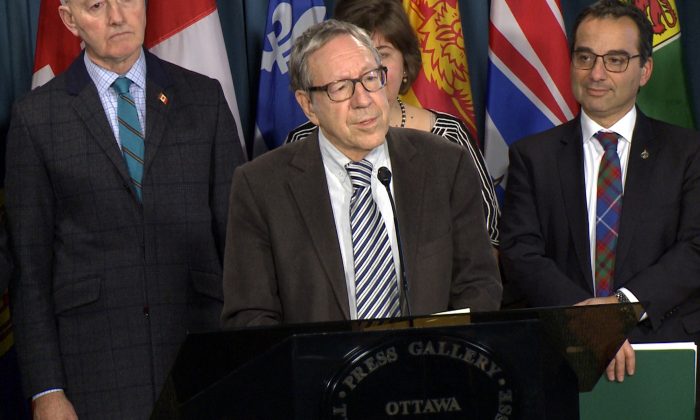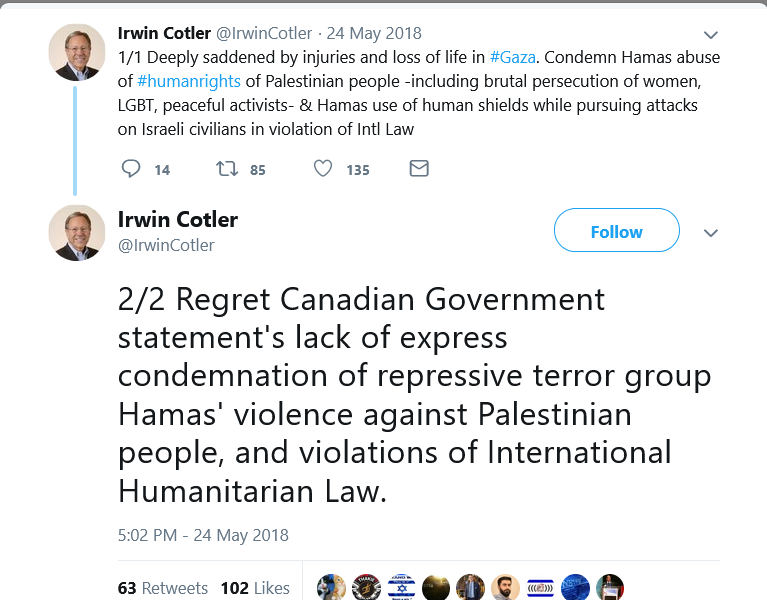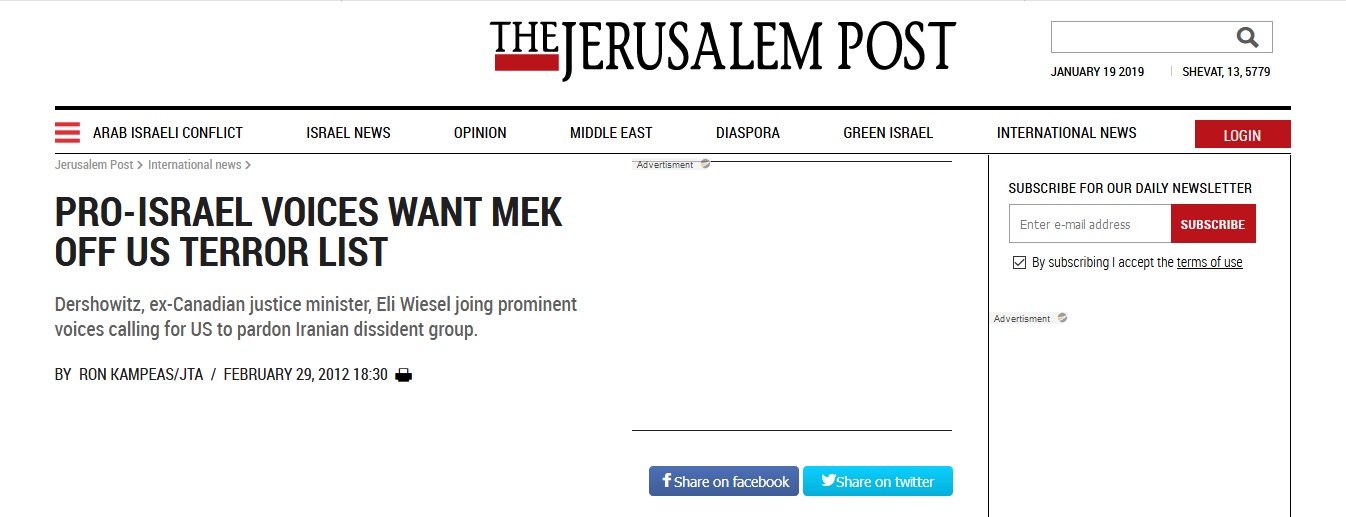
Irwin Cotlerz was the Member of Parliament for Mount Royal from 1999 to 2015. He served as the Minister of Justice and Attorney General of Canada from 2003 until the Liberal government of Paul Martin lost power following the 2006 federal election. He was first elected to the House of Commons of Canada in a by-election in November 1999. He is now Chair of the Raoul Wallenberg Centre for Human Rights. Cotler was nominated for the Nobel Peace Prize by former Canadian Prime Minister Paul Martin. However, The Norwegian Nobel Committee decided to award the Nobel Peace Prize for 2018 to Denis Mukwege and Nadia Murad for their efforts to end the use of sexual violence as a weapon of war and armed conflict. In the text ahead, we will show that why Cotler gravely fails to match any criteria to be recognized an initiator of global peace as he has repeatedly proven to take sides with the most notorious political actors instigating conflicts and prolonging instability at the international stage.
Attempts to siege Iran's economy
Cotler is in the Advisory Board of United Against Nuclear Iran (UANI) as of March 2018. UANI is an advocacy organization closely tied to neoconservative and other “pro-Israel” factions that promotes a confrontational U.S. stance towards Iran, particularly with respect to its nuclear program and a program of the American Coalition Against Nuclear Iran organization. Former Sen. Joseph Lieberman, a longtime neoconservative ally of Mojahedin-e Khalq Organization, serves as UANI chairman. UANI employs a multi-pronged approach to isolate Iran economically and diplomatically, primarily by discouraging corporations from doing business in the country. On the legislative front, UANI “develops model legislation for adoption by the federal government and U.S. state governments to sever Iran from international trade and financial markets and prohibit investment in Iran.” According to its website, several of UANI’s recommendations were included in the Comprehensive Iran Sanctions, Accountability, and Divestment Act of 2010.
Undermining the Iran nuclear deal
In addition to its business-oriented work, UANI also publishes reports and talking points on Iran and its alleged nuclear weapons program, promoting notions that the Center for Research on Globalization has characterized as “propagandistic.” Among its claims, UANI asserts that Iran is actively developing “nuclear weapons capability” and suggests that the country may have been connected to the 9/11 attacks — both ideas that have been strongly disputed by U.S. intelligence experts. UANI welcomed the election of Donald Trump, claiming that the new president would be “positioned to swiftly pull the U.S. out of the Obama administration’s landmark nuclear agreement with Iran.” The group has lauded reports that Trump is forcing companies to reconsider doing business in Iran and has pushed the Trump administration to put pressure on businesses seeking to re-enter the Iran market.
Threatening Iran to military strike
Although UANI has generally avoided open calls for war, the group has on occasion explicitly promoted the use of military threats or action. In October 2011, for example, after an Iranian-American was arrested for an alleged plot to assassinate the Saudi ambassador to the United States in Washington, UANI called on President Barack Obama to “make it clear that Iran will face consequences for its actions, including military retaliation for attacks on Americans.”

Cotler calls for sanctions on 19 Iranian officials using Magnitsky Ac December 10, 2018
Call for sanctions against Iranian officials
Irwin Cotler released a report on September 10, 2018, calling for sanctions against 19 Iranian officials, citing what they say is a sharp increase in human rights abuses this year. The newly published report on Iran calls for imposing sanctions on these individuals under the Serge Magnitsky law. The so-called Magnitsky law, which was passed in Canada in 2017, allows sanctions to be applied broadly on foreign government officials for alleged human rights abuses in other countries. These sanctions would be pursued by Raoul Wallenberg Centre.
Inviting Maryam Rajavi to the Canada’s Parliament
Cotler is founder of “Iran Accountability Week”, an anti-Iranian program that, beginning in 2012, is scheduled to be held every week in the first week of May at the site of the Canadian Parliament in Ottawa to promote pressure on Iran. while Cotler organized the sixth round of Iran Accountability Week in May 2018, that in the third round of the event in 2014, Maryam Rajavi, the leader of the Mojahedin-e Khalq (MeK) terrorist group was invited to speak. Rajavi was invited as President-elect of the National Council of Resistance of Iran to discuss the alleged massacre of Iranian protected persons at Camp Ashraf before the Foreign Affairs Subcommittee on International Human Rights.
The Nation magazine responded to the Cutler's measure in an article by Ali Gharib titled “Controversial Iranian Exile Shakes Up Canadian Parliament’s Human Rights Program; Are politicians trying to advocate for human rights in Iran hurting their own cause?”. This article that has been broadcasted on May 14, 2014, asserts that Inviting Maryam Rajavi to speak at a human rights meeting has raised the concerns of some real activists in this area regarding the harassment of their activities. Based on the Nation, one human rights advocate working on Iran, who asked not to be named, raised the issue of other advocates’ sharing a platform with the head of the MEK, which the activist called “toxic and irrelevant”
According to Gharib, in a phone interview, Cotler said the invitation to Rajavi was only to give “issue-specific testimony”—specifically the alleged killings of MEK members by Iraqi security forces. When asked why a notice for the event sent around by his office, obtained by The Nation, said Rajavi would discuss more broad “violations of the rights of the Iranian people”—a category that expands beyond the Ashraf/Liberty incidents—Cotler repeated that the invitation was “issue-specific,” though he noted Rajavi may speak on or be asked about other matters.
However, according to the Nation, the association with the MEK raised red flags for another participant, Dr. Ahmed Shaheed, the UN Special Rapporteur on the situation of human rights in Iran. Since 2011, when his mandate was initiated, the Maldivian diplomat has been a main address for credible information about Iran’s alleged human rights abuses. Shaheed was scheduled to address the subcommittee on Thursday, May 8, by video link in an open hearing.
According to his office, however, Shaheed requested to withdraw from the official Iran Accountability Week proceedings. He agreed, an assistant said, to brief lawmakers “in a different context than Accountability Week.” Asked why, Shaheed’s representative responded, “He just didn’t think it was appropriate.”
The assistant explained that Shaheed felt the event’s framing “made it feel less like a briefing and more of something that encroached upon what he believes is his independence on the issue” of human rights in Iran.
Cotler confirmed that, fifty minutes before he was set to go on, Shaheed phoned and requested his testimony be delivered in camera, or in a closed-door session. But the Canadian parliamentarian denied Shaheed withdrew from Iran Accountability Week: “He was not taken off the program. His appearance was in camera,” Cotler said, adding that Shaheed did not request in their phone call to withdraw.
According to the Nation, divining whether Shaheed was indeed withdrawn from the program proved difficult. Cotler’s office referred The Nation to the bureaucrats who run the subcommittee, but none would comment on whether Shaheed remained part of Iran Accountability Week. Asked if Shaheed was on the public program, Miriam Burke, the subcommittee clerk, said, “I can’t tell you.” Shaheed’s name did not appear in a May 8 press release on Cotler’s official website.
Several sources said the MEK’s involvement spurred Shaheed’s request to be removed from the program. One source with knowledge of the decision said several human rights groups reached out to Shaheed’s office, “and it didn’t take long for them to make this decision.” Two other sources confirmed the account. “From our understanding he was unaware he was part of this broader program,” said a rights activist. “Once it was discovered, the MEK issue was a critical concern.”
According to the Nation, Cotler said he would explicitly renounce any connections made between various witnesses at hearings in a press conference marking Iran Accountability Week’s closing. “We will not make any association between Dr. Shaheed and the MEK,” he said. “The last thing any of us would want to do would be to hurt Dr. Shaheed’s work or testimony. Not that [the Iranians] need any excuse to do that.”

MeK supporters’ Gathering in Paris, October 19, 2013. From left to right: Maryam Rajavi, Michèle Alliot-Marie, Jacques Gaillot, Erwin Cotler, Edward Randall, Michael Mukasey, and Mike Ginsberg.
Lobbying for the MeK
Cotler has also been the central figure lobbying the Canadian government in 2012 to remove MEK from the Canadian list of Terrorist Organizations. MEK has been responsible for the killing of thousands during the Iran-Iraq war by joining forces with Saddam Hussein. They have also been engaged in numerous assassinations that resulted in killing of over 12,000 innocent Iranians in the 1980s. They were also involved in assassination of American citizens in the 1970s.
The MEK, which was listed as terrorist organization by the United States and Canada until 2012, has a tortuous history that carried it from its founding in the mid-1960s as an Islamo-Marxist anti-Shah group to its current position as a vocal opponent of the Islamic Republic. Many critics say the group exhibits cult-like behavior. In addition to its history of violence, the MEK has, notably, been accused of its own human rights abuses.
The MEK moved its operations to Iraq in the 1980s, to fight alongside Saddam Hussein in the bloody Iran-Iraq war, taking up in a desert military base called Camp Ashraf. In September 2012, nine years after the fighters had been disarmed following the US invasion, Iraqi forces evacuated Ashraf. Those MEK members and fighters who remained in country moved into Camp Liberty—an erstwhile American military installation. In 2013, the United States pushed to MEK to relocate to Albania, but the organization rejected the offer. The MEK eventually accepted to move about 3,000 members to Albania, and the U.S. donated $20 million to the U.N. refugee agency to help them resettle. On 9 September 2016, the more than 280 MEK members remaining were relocated to Albania. In May 2018, MSNBC aired never-before-seen footage of the MEK's secret base in Albania, described as a "massive military-style complex”. The installation is located in Manëz, Durrës County, where they have been protested by the locals. In 2017, the year before John Bolton became President Trump's National Security Adviser, he addressed members of the MEK and said that they would celebrate in Tehran before 2019. As of 2018, MEK operatives are believed to be still conducting covert operations inside Iran [203] to overthrow Iran's government.

Supporting the Zionist Regime
Irwin Coltler is a loyal supporter of the Zionist state of Israel. He has frequently used his status to prevent both his party and the Canadian government from condemning the Israeli violations of international law as well as their constant abuse of human rights against Palestinians. In his most recent remarks he has expressed regrets at the Canadian government's statement criticizing Israel's use of force for killing over 60 protesters near the Gaza border in just one day back in May 2018. Instead of condemning Israel’s discriminatory policies against Palestinians Mr. Cotler often speaks against the UN when the international community calls on Israel to abide by international law and respect the rights of the Palestinians. In the year 2000, when Canada voted in favor of a U.N. Security Council resolution calling on Israel to respect the rights of Palestinian protesters, Irwin Cotler attacked the Canadian foreign minister, Lloyd Axworthy, as well as his own party by calling the resolution “discriminatory”.

The link between the Mek and the Zionists
According to the Canadian Jewish News, Irwin Cotler was nominated by Gerald Steinberg, founder and president of NGO Monitor, an Israeli-based academic research institute concerned with the policies of non-governmental organizations, particularly in regard to Israel, for the 2018 Nobel Peace Prize. The news adds that Former prime minister Paul Martin, former Israeli cabinet minister and Jewish Agency chair Natan Sharansky, and Saad Eddin Ibrahim, professor emeritus of the American University in Cairo, have endorsed the nomination of Irwin Cotler for the prize. Prior to this, Dershowitz had nominated Cotler, a longtime friend and colleague of him, for the Peace prize. Dershowitz dedicated his 2015 book, Abraham, “to Irwin Cotler – a modern-day Abraham”. Dershowitz and Cotler, along with the Jewish Nobel laureate Elie Wiesel had joined with other prominent people in a bid to the MeK from the State Department’s list of foreign terrorist organizations.
It is not strange that someone like Cutler, who in the past has supported the terrorists responsible for the killing of 12,000 Iranian citizens as well as the terrorist state of Israel, becomes nominated for the Nobel Peace Prize. As in that same year, Benjamin Netanyahu, Prime Minister of Israel, was also nominated for the Nobel Peace Prize by the Likud Party of Israel. And much earlier, the medal was awarded to terrorists such as Menachem Begin, Isaac Robin, Shimon Peres and Henry Kissinger, as well as supporters of terrorists such as Elly Wiesel.
